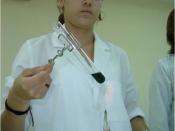All sociological researchers make use of the data collected to test their hypotheses, but the way and methods used differ from one sociological study to another. There are four general techniques, the case study, the experiment, the observational study and the survey. An experiment is a scientific method in which data are collected to be tested to prove a hypothesis using either independent variables in a closed environment or dependent variables in an opened environment.
There are two types of experiment, the laboratory experiment that is as its name suggests conducted in laboratory and the field experiment conducted in a natural environment. The advocates of positivism support the use of experiment due to its many advantages. Karl Popper for example, believed that the experimental method is extremely useful because it allows the sort of precision in the making and repeated testing of predictions that he advocates. Due to its accuracy in producing scientific results, researchers can be more confident since their theories can be tested scientifically.
In the laboratory experiments, independent variables can be controlled and manipulated however they wish. They can isolate variables and add variables to measure the effect of the dependent variables they are studying. This enables them to make predictions and establish correlations, causal connections and supposed laws between the variables. For example, if the researchers want to find the remedy for a disease for example cancer he or she may isolate the dependent variables and add external elements, the independent variable to see the effect of such action whether or not the independent variable can eliminate the cancer cells.
The result will then be observed, measured and quantified. This is another advantage of the laboratory experiment. The result can be objectively observed and the researchers' value judgment will have less or no effect on the result.
The laboratory experiment also facilitates replication so long as the precise nature of the experiment is recorded, other scientist can reproduce identical conditions to see if the same results are obtained. Other researchers are able to falsify or verify the earlier result obtained. This is crucial to ensure that all scientific results are reliable.
The use of experiment reflects natural science methodology that advocates accuracy reliability and precision. Clearly by the use of experiments, sociology can be considered as a science.
There are however several limitations and exceptions in the experiment method. The primary weakness is that its results may not apply to outside of the experimental setting. By creating an artificial condition, researchers are actually assuming that the natural setting is similar to the experimental setting. This might render the outcome of the study. The real world may not be as controlled as the experiment since there are other external factors such as human conciseness that must be dealt with. Therefore, the results have limited or unknown validity.
It is also impractical to carry out experiments in laboratories on many subjects of interest to sociologist. Sociology is the study of society. Every aspect of individuals in society must be considered. By selecting a group of people to represent the entire society, the results may be doubted. Researchers may use volunteers that consist of students. This may not reflect the true nature of the phenomenon being studied. It is not possible to fit the entire society into the laboratory. The selection of volunteers may not be diverse and personal judgment may enter the research.
Researchers on societies may take quite a considerable time. It is not possible to carry out experiments over a sufficiently long time span to study social problems such as social change.
All experiments are constraint on a certain amount of physical limitations be it the source of income, time and current state of knowledge. Researchers have to make use of the limited amount of resources. This will render the results. Experimental methods are confined to small scale studies.
Field experiments have the problem of not being able to control variables as closely as in the laboratory experiments. For example, in the Sisson's experiment, it was not possible to carry out two or more experiments at the same time and at the same place due to many limitations. Therefore variables such as weather, the time of day and the state of feelings and emotions of the subject matter have affected the results.
Political pressure drives experimentation and forces unreliable results. Sometimes the researchers may have the consent from the government before conducting their experiment. The fact that the government may influence the research made the result not totally reliable. Specific funding and support may drive the outcomes of experimentation and cause the results to be skewed. The reader of these results may not be aware of these biases and should approach experimentation with a critical eye.
Researcher's biasness, interest may alter or render the results. Often, results that do not suit the researcher's paradigm are altered or sometimes variables are added or manipulated to be in line with their interest.
In some field experiments the fact that the experiment is taking place may render the results. This is known as the Hawthorne Effect. The subject matter being tested will not act naturally and this will create a false picture of phenomenon being observed. The Hawthorne Effect was a term used in scientific studies after a famous experiment conducted at the Hawthorne works of the Western Electricity Company in Chicago. The experiment was intended to test and measure workers productivity. The fact that they knew they were being observed made them responded to the test.
Ethical issues may emerge during the process of experimentation. To avoid the Hawthorne Effect, researchers will sometimes be forced to carry out the experiment without the consent of the subject matter. The morality of carrying out such experiments can be questioned. Some experiments may defy ethical and human rights.
Since scientific method is a matter of human construction, it is subject to human error. The researcher's Personal bias may intrude upon the experiment, as well. For example, certain preconceptions may dictate the course of the research and affect the behavior of the subjects. The researcher does bring bias to experimentation, but bias does not limit an ability to be reflective. An ethical researcher thinks critically about results and reports those results after careful reflection. Concerns over bias can be leveled against any research method.
The subject matter of sociology, human being has consciousness, feelings and emotion. To study human behavior with accuracy is not possible. When a human population is involved, experimental research becomes concerned if behavior can be predicted or studied with validity. Rationalizing human behavior through the process of experimentation, when a researcher is conducting the experiment in a laboratory and creating an artificial condition does not account for the process of thought, making outcomes of that process fallible (Eisenberg, 1996).
From my personal view, experiment is still the best method to be considered when conducting sociological study because of its accuracy compare to other methods. To overcome the limitations of experimental method, researchers can think of other ways, for example combining their experimental method with other qualitative methods such as case study, ethnography, observational research and interviews. These methods can be used as preconditions for experimentation or conducted simultaneously to add validity to the study.





